Hiring the right talent is always an uphill battle, and most recruiters would agree. So many things can go wrong—communication could break down, follow-ups could fall through the cracks, etc. Such misses often lead to a poor candidate experience.
This, in turn, can damage your company’s reputation and make it harder to attract top talent.
But there’s an effective solution— Candidate Relationship Management (CRM) tools. These platforms can transform how you manage candidate experience.
In this blog, we’ll explore 13 of the best candidate relationship management systems that can simplify your recruitment process and help you build stronger connections with candidates.

13 Must-Have CRM Tools for Hiring Success
The right CRM tools can streamline your efforts, enhance candidate engagement, and lead to better hires. Here are 13 CRM tools that can elevate your recruitment game to the next level.
- Bamboo HR
- Manatal
- Bullhorn
- Greenhouse
- Loxo
- Lever
- Symphony Talent
- Gem
- Beamery
- Recruit CRM
- Tracker RMS
- Hireology
- Yello
1. Bamboo HR
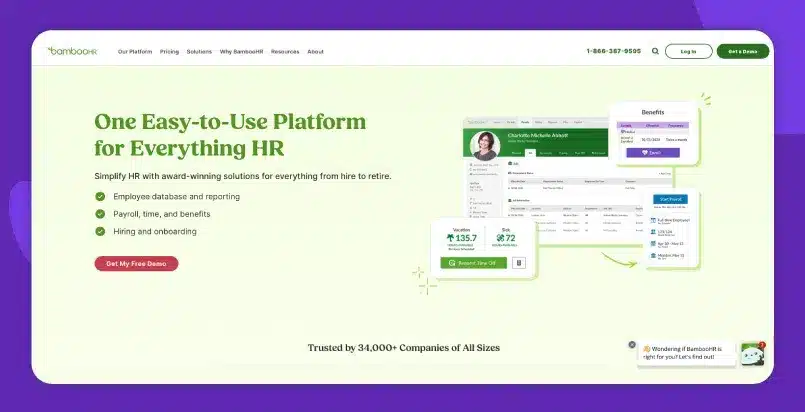
Bamboo HR is a popular candidate management tool that streamlines sourcing and onboarding processes. BambooHR’s focus on simplifying candidate engagement tasks allows you to focus on strategic growth and fine-tuning candidate relationship management strategies.
The platform is particularly known for its ability to transition you from hiring to onboarding. From getting important paperwork signed electronically to introducing hires to their new team, Bamboo HR handles everything.
Key Features
- Mobile app: This feature lets you post jobs on the go and review candidates the minute they apply. Other permitted stakeholders can see resumes and provide ratings and feedback from anywhere.
- Customizable offer letter templates: This feature automates and optimizes the tedious process of creating tailored offer letters for each individual role. It auto-populates candidate info based on job positions, job types, and other information.
- Reports and analytics: This module lets you track and monitor a variety of metrics related to your hiring process. It is quite useful for identifying bottlenecks in your efforts to offer a great candidate experience.
Why pick BambooHR?
- The platform lets you create custom permissions to gather input from team members at any stage safely and quickly.
- The platform sends automatic alerts to keep things moving without drops in communication.
- You can post jobs across multiple channels right from BambooHR, including popular ones like Indeed, Glassdoor, and ZipRec.
Pricing
Contact the BambooHR sales team for pricing details.
2. Manatal
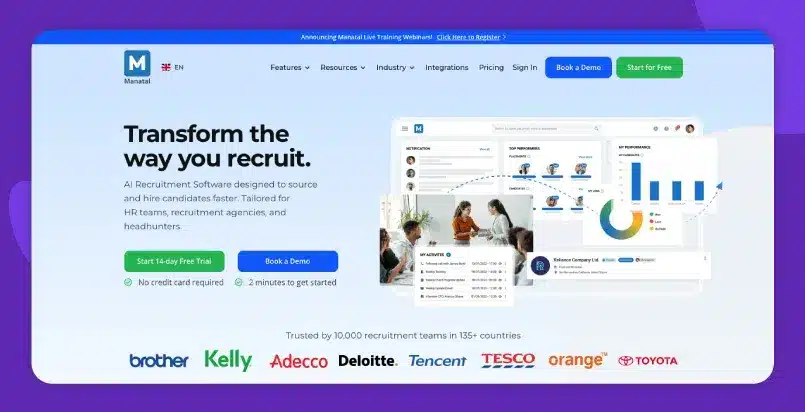
Manatal is an AI recruitment software with a goal to help you hire faster. The platform’s proprietary AI engine makes the job of sourcing seamless, as it can sift through 20+ social media and public platforms to gather details about candidates. This enables your hiring team to gather insights that go beyond simple resumes.
The platform also comes with an AI recommendation feature that recommends the most suitable candidates for jobs and the most suitable jobs for candidates.
Key Features
- Activities: This feature lets you organize and manage hiring tasks with great ease. You can not only assign activities to other users but also monitor their progress.
- Integrated Chat: This feature lets you tag team members in a note so that critical information related to a candidate reaches them on time. Assigned team members will receive instant notification.
- Candidate Tags: This feature lets you use tags and associate them with a candidate, making it easier to identify and manage candidates.
Why pick Manatal?
- It is one of the most affordable CRM tools in the market right now.
- The platform offers a dedicated inbox to communicate via email with your candidates.
- Manatal even lets you create and share email templates with your team. The templates cover almost every stage of your recruitment process.
Pricing
There are multiple plans offered by Manatal. The Professional plan costs $15 per user per month, the Enterprise plan costs $35 per user per month, and the Enterprise Plus plan costs $55 per user per month. All these plans offer a free 14-day trial. There is also a full custom plan for those who need additional capabilities.
3. Bullhorn
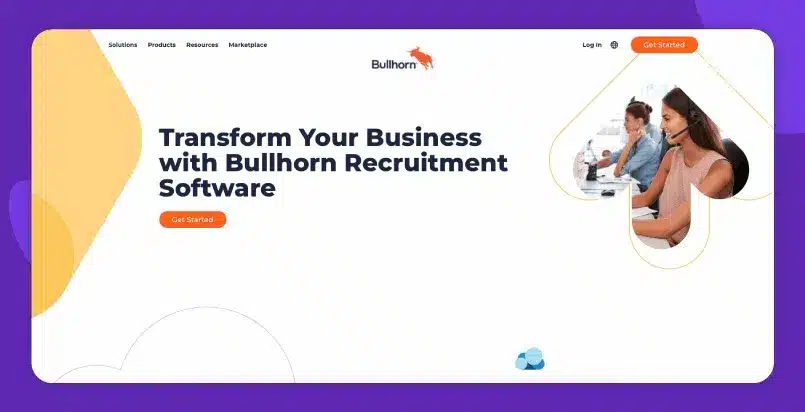
Bullhorn is a combination of ATS and CRM system that serves recruitment agencies of all sizes and caters to varied industries. The platform is perfect for closing the loop between your sales and recruiting processes. Bullhorn is particularly known for its collaboration capabilities.
For instance, you can invite any employee in your organization to have a conversation with a candidate. You can also send group broadcast messages and instantly convert them into 1:1 conversations.
Key Features
- Email Integration: The platform lets you parse resumes and create tasks directly from your inbox (both Gmail and Outlook). This way, you can track all your candidate-related emails right within Bullhorn.
- Bullhorn Messaging: This feature lets you communicate faster with your candidates as you can reach them with your message right on their mobile phone.
- Ad Hoc Reporting: This feature lets you go beyond standard reporting and report on any given data point within the Bullhorn CRM.
Why pick Bullhorn?
- Bullhorn offers its patented Pulse technology to enable users to track all the email activity related to a candidate.
- It is one of the few platforms that is suitable for businesses of all sizes.
- The platform can be integrated with the Salesforce ecosystem, making it an excellent choice for Salesforce users.
Pricing
You need to book a demo to get the pricing details.
4. Greenhouse
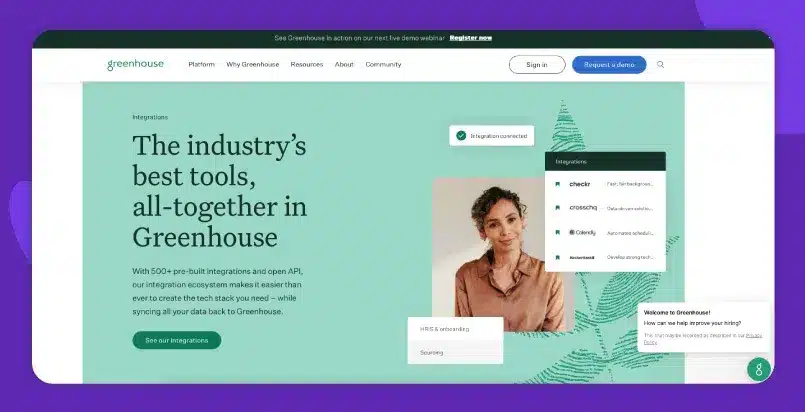
Greenhouse is an all-in-one hiring platform that handles talent sourcing, candidate experience, and even onboarding. The platform is known for introducing some of the most unique features in candidate relationship management. For instance, it allows candidates to pre-record the correct pronunciation of their name and select personal pronouns for their profile.
Similarly, the platform integrates with video conferencing tools Spark Hire, Zoom, Google Meet, and Microsoft Teams to ensure that you can conduct the interview without switching tools.
Key Features
- Automated campaigns: This feature lets you send branded and fully customized automated email and text notifications to candidates. For better authenticity, you can send them directly from your company’s domain.
- Easy applications: You can easily integrate your Greenhouse job board into your careers page. This will greatly simplify your candidates’ first step of the hiring process.
- Self-scheduling: You can give total flexibility to your candidates as they can now self-schedule interviews at a time most convenient for them.
Why pick Greenhouse?
- It integrates with over 500+ 3rd party tools to ensure you have a single source of truth for all candidate-related activities.
- Their in-house job boards are available in over 19 languages.
- The platform is quite adept at reducing the time to hire. It can even send automated notifications to hiring managers when a candidate has been in a stage too long.
Pricing
You need to request a demo to get the pricing details.
5. Loxo
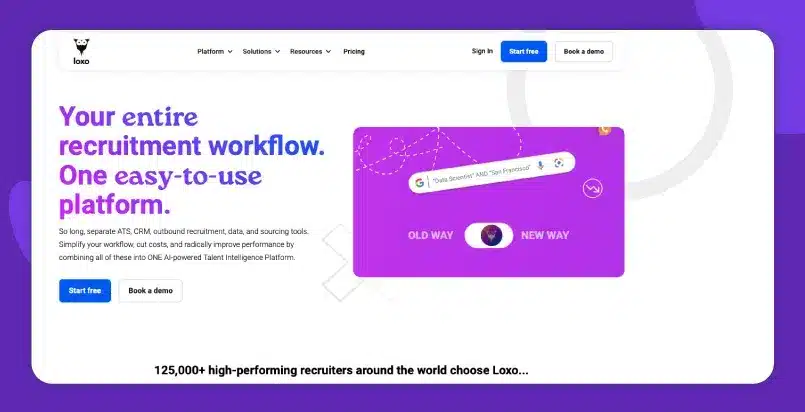
Loxo is an AI-powered recruitment platform designed to improve candidate experience and enhance hiring speed. It comes loaded with innovative capabilities that enable you to build a strong talent pipeline.
Loxo also caters to various industries, including healthcare, technology, software engineering, and education.
Key Features
- Outreach GPT: This feature automates the whole campaign creation process and tailors it to the job profile, your company, and your candidate. This lets you build deeper engagement with the candidates.
- Chrome extension: Loxo offers a Chrome extension that lets you source talent directly from your browser and pull them into automated outreach campaigns. No more switching of platforms or windows.
- Loxo Connect: It provides and verifies contact information in real-time so that you can build relationships with hard-to-find talents that are typically not found on most job boards.
Why pick Loxo?
- Loxo’s proprietary AI automates every stage of your recruitment workflow, from surfacing best-fit candidates to retrieving contact information.
- You can diversify your candidate outreach through various channels, such as SMS, text, voice calling, and inMail.
- It is also quite suitable for handling a large candidate pool, thanks to features like bulk outreach.
Pricing
Apart from a forever-free plan, there is a Starter plan costing $119 per user per month. There are also two other plans, Professional and Enterprise, that have tailored pricing. All the critical features like Reporting, Resume Parsing, and Loxo Outreach are available only in the paid plans.
6. Lever
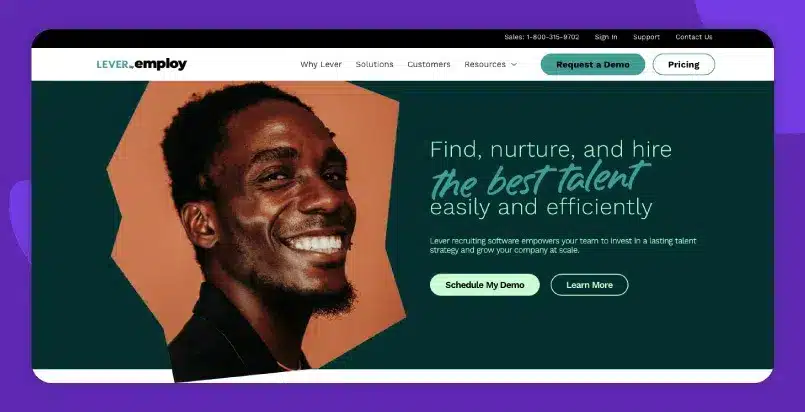
Lever is a powerful applicant tracking system that comes with interactive candidate relationship management capabilities. The platform ensures that talent teams of all sizes can effortlessly find, nurture, and hire the best talent for their organization.
The platform leverages automation to a considerable extent, enabling you to fill positions faster and minimize productivity losses. You can also provide an enhanced candidate experience through the platform’s smart communication capabilities.
Key Features
- Multi-channel sourcing: This feature lets you source candidates across various platforms, including job boards, social media, and email. This ensures a broader reach and a more diverse talent pool.
- Candidate Experience Surveys: This feature provides valuable feedback from applicants. It further helps you refine hiring processes and improve overall candidate satisfaction.
- Analytics: In addition to basic analytics and reporting, Lever offers advanced features like a candidate survey dashboard, pipeline and sourcing dashboards, and data export to provide a holistic view of the candidate.
Why pick Lever?
- Has a vast integration marketplace with hundreds of tools offering plug-and-play integration support.
- Offers a Chrome extension to enable recruiters to pull candidate information from the sites on which they are sourcing.
- The platform’s reporting capabilities are quite robust and can be easily customized to suit your precise needs.
Pricing
You need to book a demo or contact the sales team for pricing details.
7. Symphony Talent
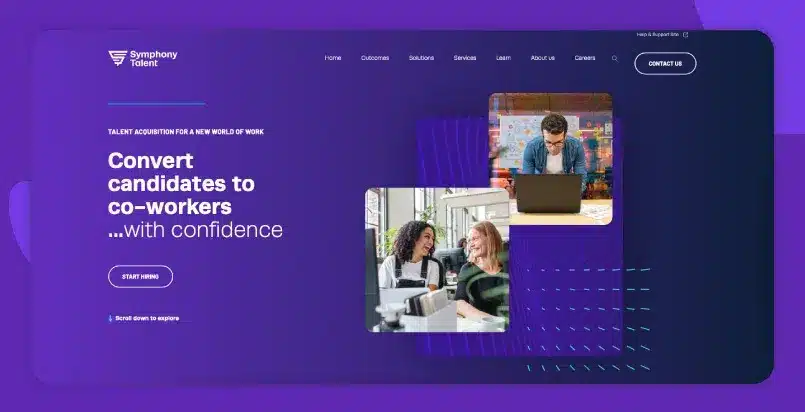
Symphony Talent is candidate relationship management software that gives you complete visibility into your candidate pipeline. It helps you evaluate various variables to identify the best-fit candidates. It offers smart automation and workflows that can help you maximize candidate engagement.
It also allows you to enhance your brand perception among candidates by delivering targeted, high-quality content at the right time and through the right channel.
Key Features
- Referrals: This feature lets you expand the power of your existing employees’ networks and find the best talent for your company.
- Recruitment Events: Symphony Talent’s capability enables you to organize and host recruitment events with great ease. You can leverage pre-built invite lists or automatically add events to your career site for better response rates among candidates.
- Chatbots: This feature lets you deliver a consistent and engaging experience with AI-powered chatbots. It is an excellent channel for candidates to connect and interact with your employer brand for any information.
Why pick Symphony Talent?
- It is one of the few platforms to use programmatic media advertising to find best-fit candidates.
- It lets you conduct video interviews right within the platform. No need to find another tool for the same.
- You can conduct objective data-driven assessments using Symphony Talent.
Pricing
Contact the sales team for plan details.
8. Gem
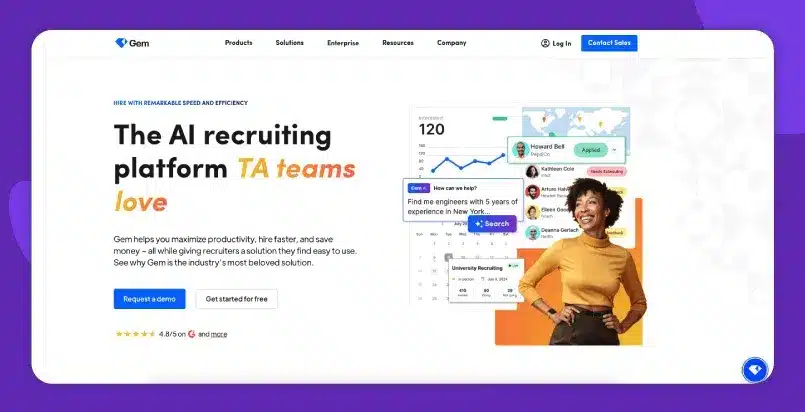
Gem is a comprehensive recruitment platform that covers the end-to-end hiring process. It handles everything, from sourcing to tracking the impact of your hiring efforts. Interestingly, you can also visualize your end-to-end recruiting funnel with great accuracy and uncover opportunities to improve candidate passthrough.
Gem also effectively uses historical candidate data and various advanced forecast models to ensure that you can plan your hiring strategy accordingly.
Key Features
- Talent Nurture: With this feature, you can send promising applicants into a separate candidate pool where you can nurture them for future collaborations if they don’t advance.
- Events & Landing Pages: Using this module, you can design branded landing pages using a no-code interface. You can use the created page to promote your hiring events.
- Standardize reporting: The platform comes with various out-of-the-box reporting templates that can be customized to your precise needs so that you can make hiring decisions that align with your organizational objectives.
Why pick Gem?
- Gem integrates with over 70+ tools, including ATSs, communication tools, scheduling tools, etc.
- It is one of the few tools that lets you focus even on past qualified candidates instead of just new talent. This ensures that you have access to the best people for the job, no matter when they send their resumes.
- The platform also has an array of tools for campus recruitment.
Pricing
Contact the sales team for pricing details.
9. Beamery
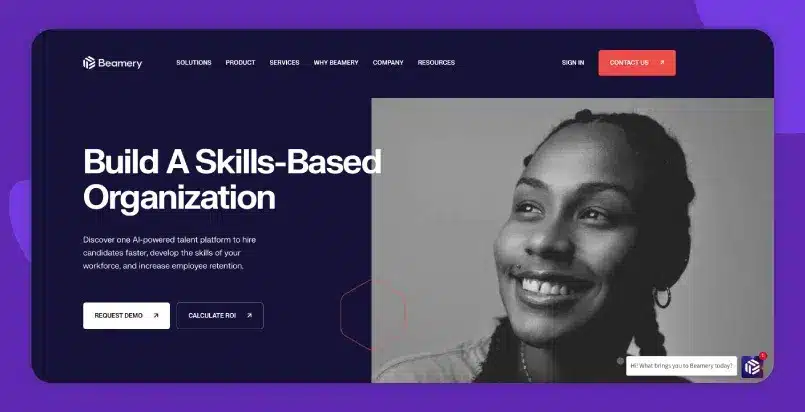
Beamery is talent lifecycle management software that optimizes talent acquisition and workforce planning. It provides a 360-degree view of every candidate in your database, including their skills and connections.
Using this valuable information, you can automatically fill your talent pool with candidates who match closely with your organizational goals. Beamery also empowers you to market your company to candidates at every stage so that they will have you at the top of their minds all the time.
Key Features
- TalentGPT: This capability allows you to leverage the power of generative AI to craft personalized experiences via automated conversations with both hiring managers and candidates.
- Automated triggers: Beamery can trigger campaigns in real-time based on different variables, such as the candidate’s activity on your career page or attendance at an event.
- Skills Intelligence: This module gives you actionable insights into your company’s existing and adjacent skills. You can use this understanding to make informed decisions about building a talent pool for future needs.
Why pick Beamery?
- With Beamery, you can segment candidates using smart filters. This lets you personalize every aspect of your messages with dynamic data.
- You can schedule interviews and collect feedback from your candidates from right within your talent pipeline.
- You can effectively project the number of candidates you are on track to hire and the resources you would need to meet your goals.
Pricing
Contact the sales team for pricing details.
10. Recruit CRM
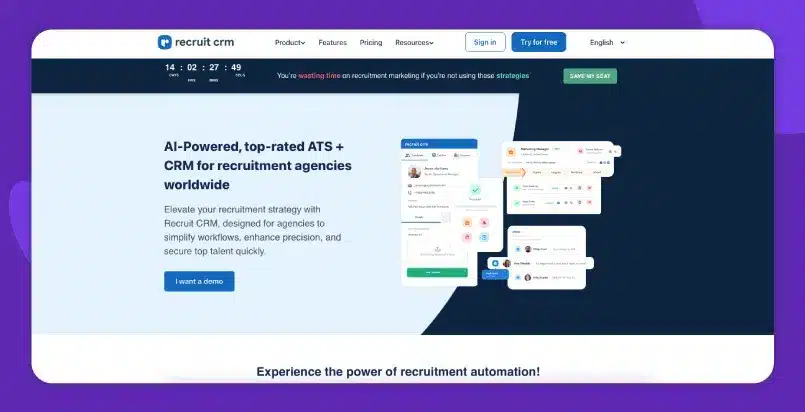
Recruit CRM is a no-code solution for managing relationships with candidates and eliminating repetitive tasks in the recruiting process. It allows integration with over 1,000 third-party applications, allowing you to create fully customized workflows.
The platform lets you oversee the entire candidate lifecycle, from sourcing to onboarding, and even provides valuable insights into their progress and key milestones. This allows you to take quick action when things are not going according to plan.
Key Features
- Emailing: It offers one-click integration with different email systems, such as G Suite, Outlook, and IMAP, to streamline communication. It also offers automated triggers, ready-to-use templates, and personalized bulk messaging.
- Analytics: You will get access to various metrics related to team performance, deals, time to hire, and other job statistics so that you can make data-driven decisions.
- Call: You can call candidates directly from the platform and even track the phone calls to ensure that everyone is on the same page. This feature enhances communication and collaboration.
Why pick Recruit CRM?
- The platform can be fully personalized, including tailoring fields, dashboards, and pipelines for a unique experience.
- It offers a bimetric scoring system that helps identify top candidates and ensure relevant connections with your high-potential candidates.
- You will get access to AI-generated transcripts and email templates through its GPT integration.
Pricing
Request a demo for pricing details.
11. Tracker RMS

Tracker RMS is a recruitment management system that offers a plethora of features to keep the candidates involved in the recruitment process. It is fully powered by artificial intelligence and gives you a comprehensive view of the job pipeline through its widgets.
It is also known for its AI ranking feature, which continuously learns from candidates’ ongoing engagement and applies that learning to rank resumes for informed decision-making.
Key Features
- TrackerAI: This feature leverages AI to analyze candidate resumes and job descriptions. It then automatically generates precise screening questions that assess a candidate’s suitability for the role.
- TrackerChat: This feature lets you stay connected as a team, whether in the office or working remotely. You can streamline communication with functions like @mentions and message-sharing.
- Candidate Prospecting: This feature converts your hiring process into a candidate-centric one. It effectively utilizes candidate assets, turning them into key drivers for business success.
Why pick Tracker RMS?
- It offers a robust resume parsing engine that lets you build elaborate candidate profiles in seconds.
- It offers a mobile for accessing both client and candidate portals on the go.
- The platform is beginner-friendly, with drag-and-drop capabilities in most modules.
Pricing
Request a demo to get pricing details.
12. Hireology
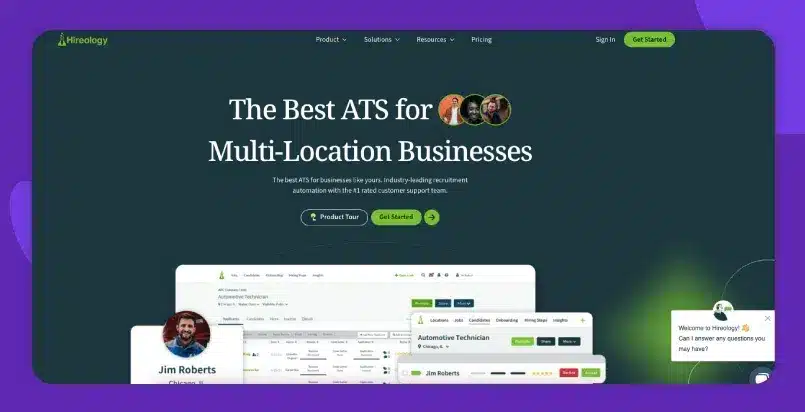
Hireology is an ATS dedicated to multi-location businesses. It is used predominantly for attracting top talent, streamlining hiring processes, and improving candidate engagement.
The platform focuses mainly on automating communication between recruiters and candidates so that no information falls through the cracks and the candidate is always in touch with the organization. This ensures that top talent are engaged, and the chances of them dropping off from the recruitment process are very slim.
Key Features
- Mobile App: Hireology offers an intuitive mobile app where you can review candidates and even communicate with talent. This ensures that your candidates never have to wait for a response.
- Central Inbox: Centralize all communication by emailing and texting candidates from a single inbox. You can even automate routine messages to save time and speed up the hiring process.
- Automated Job Description Writer: This feature uses AI algorithms to help craft clear, engaging job descriptions tailored to an open position. It not only saves time for your team but also ensures consistency in your tone.
Why pick Hireology?
- It comes with a fully automated outreach that removes manual follow-ups and streamlines the whole hiring process.
- The platform offers in-app background checks, skills tests, screeners, and more to quickly identify high-quality candidates
- All the plans let you manage unlimited jobs.
Pricing
The most basic plan, Essentials, is priced at $249 per month and offers features like texting and email, job distribution, and career site essentials. Then, there is the Professional plan, which is priced at $499 per month and has more advanced features. There is also a customizable plan for those who need tailored services.
13. Yello
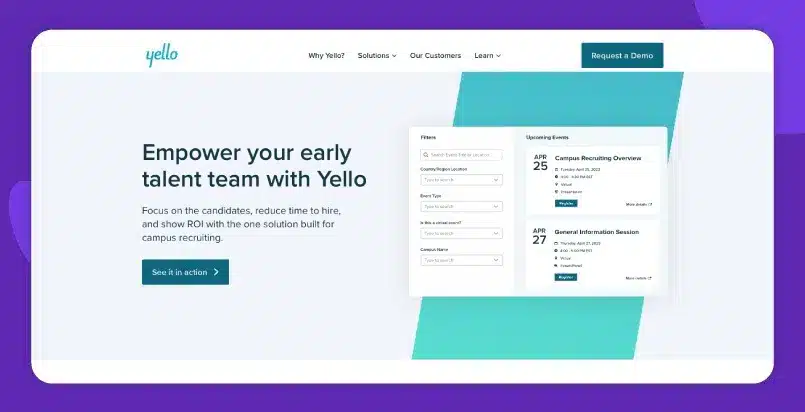
The final tool on our list is Yello, an early talent and campus recruitment platform. Yello is particularly known for its ability to automate recruitment workflows and improve candidate experience. You can build memorable recruiting experiences with Yello by automating branded email and SMS campaigns.
For instance, you can strengthen candidate engagement through targeted email content that showcases company resources. You can also track campaign performance by reviewing open and click-through rates. This allows you to focus on the most engaged candidates in your pipeline.
Key Features
- Metrics: You can easily track key candidate engagement metrics. You will have access to benchmarks, set goals accordingly, and fine-tune your engagement strategy.
- Schedule Interviews: Automate the scheduling of interviews with candidates, reducing back-and-forth communication. The tool integrates with calendars to ensure availability and minimize conflicts.
- DEI Analytics: Get real-time analytics via comprehensive dashboards that track the progress of diverse candidates through your hiring funnel. It will also highlight the schools most aligned with your DEI objectives.
Why pick Yello?
- It is one of the few platforms to be dedicated to campus recruiting.
- The platform strongly focuses on reducing reneges, a vital issue plaguing HR teams.
- It integrates with ATS and HRIS platforms, as well as KPI Boards, Assessment Applications, and Staff Calendars.
Pricing
Book a demo to get the pricing details.
🤔 How to Pick the Right Candidate Relationship Management Software?
When selecting a candidate relationship management software, consider these key factors:
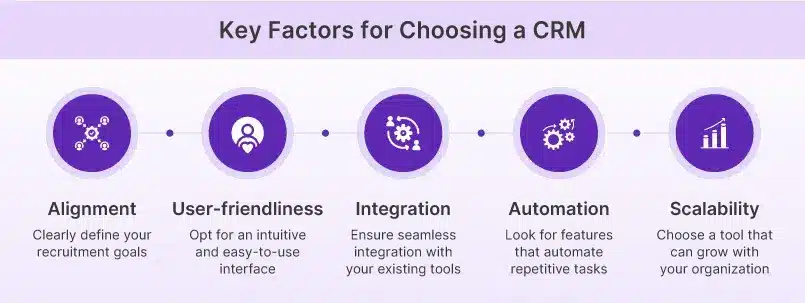
✅ Alignment with goals: Define your specific recruitment objectives, such as improving engagement or reducing time-to-hire.
✅ User-friendliness: Opt for a tool that is intuitive and easy to use, minimizing training time and increasing adoption.
✅ Integration capabilities: Seamless integration with your existing recruitment tools ensures streamlined workflows and centralized data.
✅ Automation: Look for features that automate repetitive tasks, saving time and reducing errors.
✅ Customization: A customizable recruiting CRM software adapts to your specific needs, ensuring alignment with your recruitment strategy.
✅ Scalability: Choose a tool that can grow with your organization, handling larger candidate databases without performance issues.
✅ Data insights: Robust reporting tools provide valuable data to optimize your hiring process.
✅ Cost-effectiveness: Evaluate both upfront costs and potential hidden expenses to ensure the best ROI.
✅ Support: Reliable customer support is crucial for troubleshooting issues and ensuring a smooth experience.
✅ Trial or demo: Test the software firsthand to assess its suitability before investing.
Future of Talent Acquisition & CRM
Technology is changing the game, making recruitment more efficient and personalized than ever before. Artificial intelligence (AI) is at the heart of this transformation.
AI-powered CRM tools are automating everything from finding candidates to evaluating their applications. This means recruiters and hiring managers can make smarter decisions faster. One of the most exciting developments is AI-powered resume screening.
These tools can quickly sift through piles of resumes, finding the perfect candidates for specific roles. They even evaluate skills, experience, and qualifications to give you accurate recommendations. This level of automation helps reduce bias and makes hiring more inclusive.
Peoplebox is a standout in this space.
Our tool doesn’t just match candidates to job descriptions; it also analyzes their skills to identify areas where they excel and where they might need to grow. This means you’re not just hiring for today but for the future.
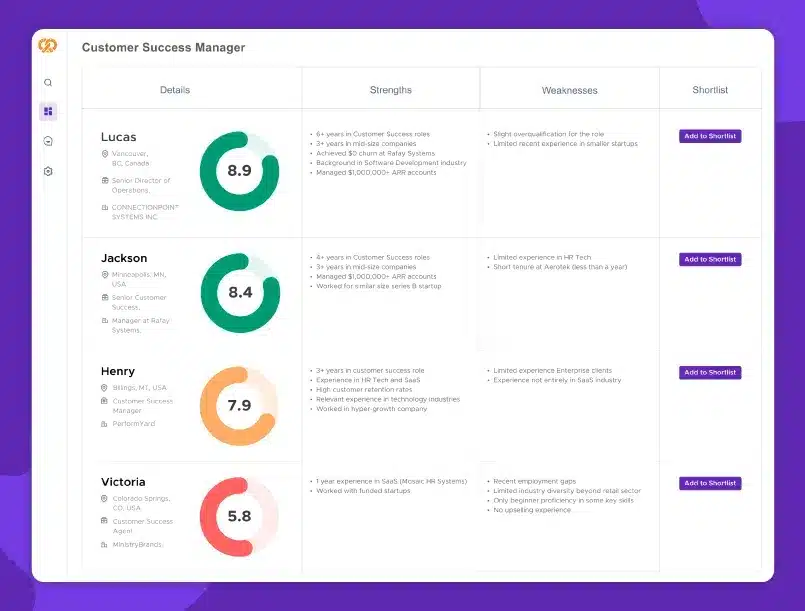
Want to see how Peoplebox can transform your hiring process? Book a demo now.







